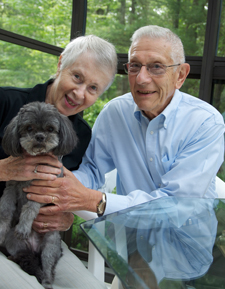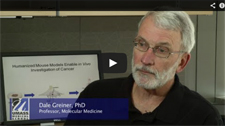
The late Dr. Eileen Berman and her husband, Stanley Berman, photographed in 2011.

Watch Dale Greiner talk about his use of specialized mouse models to study cancer, infections and other human diseases, which will benefit from the Berman Chair funding. (Click to pop up the video.)
Through the generous support of Stanley Berman and his late wife Eileen Berman, EdD, UMass Medical School has established the Dr. Eileen L. Berman and Stanley I. Berman Foundation Chair in Biomedical Research, supported through an endowed fund that the Bermans created at the UMass Medicine Cancer Center of Excellence in 2011, UMMS Chancellor Michael F. Collins announced. Dale Greiner, PhD, professor of molecular medicine, will be the inaugural recipient.
Eileen and Stanley Berman’s support of UMMS grew out of personal experience with cancer care and a deep love of Worcester. After Dr. Berman received cancer treatment at the Cancer Center in 2010, she and her husband wanted to give back to an institution and a city that had given them so much. They chose to establish an endowed fund that focuses on early detection and prevention initiatives. Prior to Dr. Berman’s passing on April 7 from cancer, wanting to do more, the Berman family recently announced that their fund would be expanded to endow a chair whose primary goal is to explore and develop pioneering therapeutic advances. The focus during the chair’s first five years will be to stimulate innovative research in appendiceal cancer, the disease that Eileen battled for four years.
“We are proud and grateful that our academic medical center is the beneficiary of the Bermans’ support for cancer research. Their generosity reminds us in a very personal way that the work we do here has an immediate and human component,” said Chancellor Collins. “Their generous support provides financial flexibility for faculty members such as Dr. Greiner to pursue novel research ideas that might otherwise not receive funding through traditional avenues, especially in the current funding environment. To a researcher, an endowment represents a special kind of freedom—the opportunity to investigate new avenues unencumbered, which can serve as a starting point for new cures and treatments for disease. UMass Medical School is fortunate to count the Berman family among our supporters.”
Endowed positions at UMMS provide an opportunity for private donors to support a specific area of academic excellence and scientific pursuit. They increase the university’s ability to retain the very best faculty and attract individuals distinguished in their fields. UMMS has 34 endowed positions that further the work of innovative and dedicated faculty members who strive to bring cutting edge research to bear on some of the most devastating human diseases.
“We wanted to take our money and see something come from it,” the Bermans said in 2011. “We chose UMass Medical School because it is local and we have emotional ties to Worcester. UMass Medical School is a growing, vibrant place. Our two children were born at UMass Memorial and most of our doctors are still there.”
The Bermans have deep ties to Worcester. Eileen was teaching English and theater arts at the Bancroft School when she first met Stanley, who had returned to his home town of Worcester after serving during the Korean War. Following his Army service, Stanley, a graduate of Worcester Academy and Worcester Polytechnic Institute, had a distinguished 30-year career at Norton Company, spending five of those years representing the company in Australia. Since then, for more than two decades, he has been a financial advisor and is currently with Morgan Stanley.
In addition to raising two children, Andrew and Johanna, Eileen had a career as a psychologist, educator and writer. While in Australia with her husband, she assisted other expatriates in managing the stress of relocation and helped companies develop strong management staff. She also wrote several books about managing life after job loss, wrote a monthly column for Business Digest for many years, and wrote columns for Industrial Management magazine.
“It gives us tremendous satisfaction to give to a Worcester organization,” the Bermans said.
Dr. Greiner’s research has focused on transplantation, autoimmunity and the use of specialized mouse models to study human diseases and infections, including cancer. The new funding will allow him to expand research that applies the use of these mouse models to the study of human cancer, in collaboration with cancer investigators at UMMS.
“I’m honored to be the first recipient of the Berman Chair, and deeply grateful for their support,” said Greiner. “We have already begun to use these specially developed mouse models to study human cancers, and this additional funding will allow us to expand that work into new areas, including appendiceal cancer. We’ve successfully used these models to study human colon cancer and our hope is that these resources will lead us to new discoveries and bring us closer to new therapeutics.”
Greiner received both his undergraduate degree and his PhD from the University of Iowa. He completed postdoctoral fellowships at the University of Pittsburgh and at the University of Connecticut Health Center. In 1991, he joined the Department of Medicine at UMass Medical School as professor; in 2010 he joined the Program in Molecular Medicine.
Greiner has co-authored more than 300 publications, served as a member of the editorial board of Diabetes, and as a member of the National Institutes of Health Immunology Sciences Study Section, and is currently a member of the National Institutes of Health Hypersensitivity, Autoimmune, and Immune-mediated Diseases study section. Additionally, he has served as chair of many ad hoc NIH and Juvenile Diabetes Research Foundation study sections, as well as chair of the Medical Science Review Committee for JDRF International; chair of the American Diabetes Association Scientific Sessions Committee and other professional science organizations.
Greiner has also received numerous awards for his research, including the A.J. Julian Scholarship for Academic Excellence, the Basil O'Connor Scholar Research Award from the March of Dimes, and the Kayla and Gerald Grodsky and David Rumbough Awards from JDRF International.